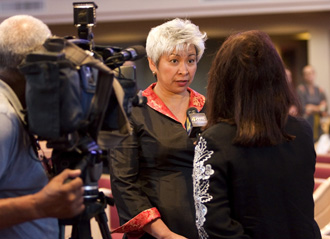$4 Million Grant Funds Disaster Readiness
Leading Gulf Coast medical centers, universities and public health institutions, including Tulane University, have united to form a consortium to improve community disaster readiness and recovery through research programs targeting health disparities, disaster preparedness and environmental health.

Dr. Maureen Lichtveld of Tulane talks with media on Friday (June 11) about a $4 million, two-year project for work on disaster preparedness and recovery in vulnerable communities. She is a principal investigator for the grant. (Photo by Ryan Rivet)
The consortium, known as SECURE (Science, Education, Community United to Respond to Emergencies), is funded through a two-year, $4 million grant from the National Center on Minority Health and Health Disparities. Members of the consortium will work collaboratively with vulnerable populations and develop best practices to promote health security, wellness and accelerated recovery from catastrophes.
“Our goal is for recovery centers such as SECURE to help health-disparity communities to plan, prepare and establish their capacity to respond to disasters of all kinds,” said John Ruffin, director of the National Center on Minority Health and Health Disparities. “The current hurricane season and the Gulf Coast oil spill will truly test the potential of this consortium in being a model for other communities confronting disasters as they seek to address the health, economic and environmental impact of these disasters.” Ruffin received an honorary degree at Tulane commencement in May.
“Emergencies that threaten the Gulf Coast vividly put the spotlight on the risks faced by our communities,” said Dr. Maureen Lichtveld, Freeport McMoRan Chair of Environmental Policy at the Tulane School of Public Health and Tropical Medicine and a SECURE principal investigator. “The current oil spill is a classic example not only of the common vulnerabilities, but also the communities' vast local knowledge and expertise. Together, we will make science work for our communities.”
Along with Tulane, consortium members are the University of Texas MD Anderson Cancer Center, the University of Texas Medical Branch, the University of Miami Leonard M. Miller School of Medicineâ“Sylvester Comprehensive Cancer Center, Baylor College of Medicine, Meharry Medical College and the Houston Department of Health and Human Services.
